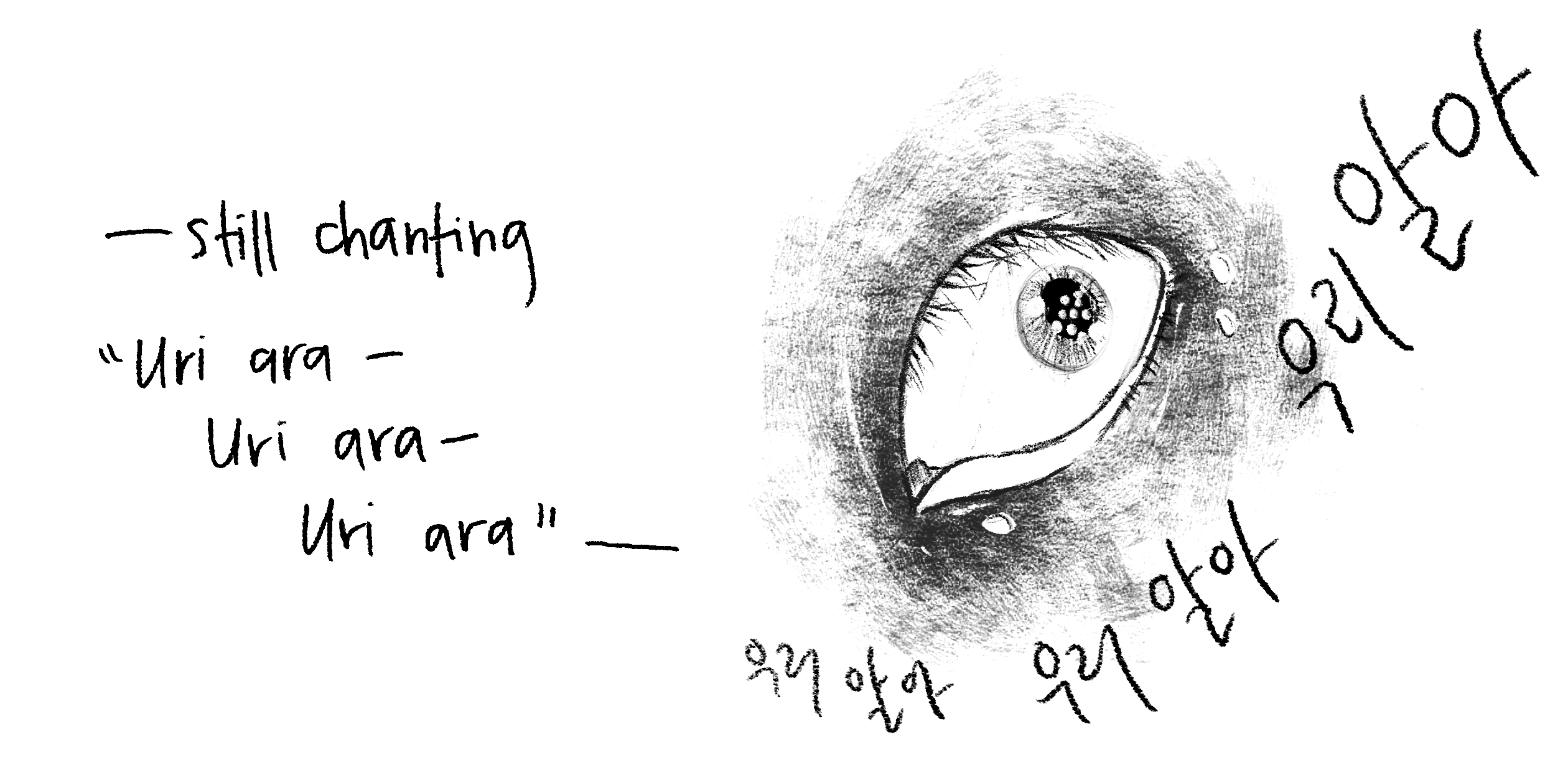
The first time I noticed the hagwon in the town of Dochang was in September, shortly after I’d moved and started teaching at the local high school. It was on the second floor of a nondescript two-story with a miyongsil and a secondhand shop, both a bit down at the edges, on the street level. I’d have missed it altogether if I hadn’t been looking up. Plump drops of rain had just begun to fall; one struck me on the forehead, and I glanced at the turbid sky above, then saw the hagwon.


It was indistinguishable from all the other hagwons in town: garish lettering on slightly dirty windows that betrayed no hint of what went on inside. At the time, I didn’t even have an umbrella; I rushed into a café to wait out the rain, and thought nothing more of the hagwon on the second story.
Those first few weeks at a new school in a new town are always disorienting at best, and I’d been finding the adjustment harder than I had expected. After a year teaching high school in Sejong City, I’d wanted to see a different side of Korea—someplace quieter, closer to country, with fewer expats around and fewer distractions. And it would certainly be better for my Korean. I’d come to Korea with the goal of becoming, if not fluent, at least proficient, spurred by dreams of becoming a literary translator; a year of teaching English, to my frustration, had left me barely any closer to this goal than I was when I began. Hours of evening study evaporated into almost nothing. I’d almost left at the end of the year, but decided to give it another try. Maybe a different place, with more pressure to use my Korean regularly, would help, I thought.
But I worried I’d made the wrong decision. Living alone, which (after the tumult of the previous year) I had dreamt would come as a relief, had turned out to be a trial; I spent far too much of my time refreshing the same half-dozen news websites minute by minute, trawling the same endless heap of outraged reactions. And I hadn’t realized just how wonderful my old school had been until I arrived at this one, where the hierarchy was far more formal and my colleagues disinterested in my work to the point of apathy. I tried speaking with them in Korean, but they seemed exasperated by my infelicity with the language. Even the students seemed dazed and distant in comparison. A month and a half in, I still hadn’t been able to draw anything more than mere pleasantries from any of them—nothing more than a very teenage “Yeah, just doing stuff later,” or “I don’t know.” (“What kind of food do you like?” “Normal food./Meat./Good food.”)
An old nervous habit, biting my tongue, had started to resurface when I spoke. It certainly wasn’t for want of proficiency in the language: I had enough Korean to hold a conversation, and their English, if anything, was better on average than my Sejong students’. In fact, some of the students’ English was of preternatural quality—idiomatic, accurate, with an accent that seemed to belong somewhere near Columbus, Ohio. These students—there could only have been a dozen in a school of some four hundred—weren’t exactly a clique, but they did spend a lot of time around each other, and they did stand out. I noticed my first, a girl named Hyein, when, during a lesson on sokdam and sayings (the textbook’s choice, not mine), I asked a second-year class one afternoon if they knew any sayings in English. A few students volunteered some simple phrases—“Win some, lose some,” “Two birds with one stone”—but then Hyein, a student who, in the first two weeks, had barely spoken, suddenly stood up, and as if for posterity, enunciated:

I stood, wordless and blinking, for a second longer than anyone found comfortable. “Where did you learn that?” I finally stammered.
“A book,” she shrugged.
“Do you know who said that?”
A split-second’s pause, as if only to let the current zap through the microscopic gates on a motherboard. “Alexander Pope,” she answered. “A poet. An Augustan. Of the eighteenth century.” As if it were simply common knowledge, and not something that nine out of ten American college graduates probably couldn’t tell you.
Why was a Korean sixteen-year-old reading—indeed, memorizing—Alexander Pope? What else did she know? I had to go back to the lesson—the other students were staring—but with every passing second, the question smoldered more uncontrollably in the back of my mind. I turned to approach her at the end of class, but she had disappeared in the normal throng before I could say her name. The students filed out, and I stood wondering, watching the door, for a full half-minute before I realized that there was a student standing to my side, just out of my peripheral vision. A boy named Sehun, short for his age, his collar askew so that the thin band of his fake tie showed around the edge.
“They’re all like that,” he told me, before I could even ask if he needed something. “The Neungnyeok students. They are all like robots. Genius English robots.”
“Neungnyeok? What is Neungnyeok?” I asked him.
“It’s the academy in the town,” he replied. “They are famous. And very good.”
“Do you go there?”
He giggled. “No, teacher. It’s so expensive. But the students always get perfect hagwon score. So they can ask a lot.”
“What do they do that’s so special?”
He looked askance at me. I rephrased the question: “Why is that hagwon so good?”
“No one knows. I think they work a lot. Those students always look tired.”
“Who else—”
“I have to go now. Bye, teacher!”
Over the next several weeks, I noticed the Neungnyeok students more and more in my classes, and around the school. They didn’t always speak up in class—indeed, they often held themselves aloof, with a mien of effortless, untraceable superiority I found inarticulably aggravating. When they did participate, it was as if they were divine heralds condescending from empyrean heights on rainbows. One boy, Sangmin, offered a lengthy and fluent excursus in the middle of a class conversation on cultural differences on the symbolic importance of cattle in the culture of the Nuer pastoralists. (The other students had been talking about things like shoes indoors and what one says when one sneezes.) Another student, Gyeongok, began to quiz me on political divisions in the English-speaking world so probingly (“In Zimbabwe, do they call them states or provinces?”) that I had to admit ignorance just so that I could move on. I felt bad about my frustration; it was possible that they were just highly intelligent, enthusiastic kids. But though I couldn’t have pointed to concrete evidence, something about their demeanor made me suspect that they were using their intelligence to toy with me—as if they knew they were making me uncomfortable, and relished it. I tried to push the thought from my head, but it kept returning.
I started to grow obsessed with figuring out the secret of Neungnyeok Hagwon. I’d stare at its inscrutable windows on walks into town for groceries for entire minutes at a time. They never yielded any answers. I asked the other English teachers at the school if they knew anything about it. Most of them lived half an hour away in Daegu, so they weren’t locals; they told me they knew nothing, with expressions that suggested they found my interest in one small-town hagwon odd at best. “What students are these?” asked the third-grade teacher.
I named a few of the group. “Oh, those students,” she grinned. “Yes, they’re all smart. I didn’t know they go to the same hagwon. They’re always with each other, I think. It’s not a problem, right? If it works, that’s a good thing!”
I asked the math teachers, too, in Korean. The other staff often ended up staring at me with the blank look of incomprehension, hampered by some error of pronunciation or word choice I couldn’t discern. I’d given so much the past year in pursuit of better Korean: forsaken travel for more classes, given up weekends for textbooks, spent hours watching indecipherable Korean TV when I could have been reading actual literature—yet most days I was dogged and dispirited by the sense that I’d learned precious little more than I had when I arrived.
Still, the math teachers understood me eventually, even if there were some snickers along the way. They told me that they thought the students were smart, but strange. “I know what you mean,” the first-year teacher said. “You know, they’re here late studying all the time, apart from hagwon times. I think they barely go home; I can’t imagine what their parents think. And they never eat here at school—lunch or dinner—which makes me wonder how on earth they manage. Maybe they just always eat in town. If their parents can afford the hagwon, that wouldn’t be a problem.”
When I saw the Neungnyeok students around school, there was something slightly unhealthy about them, as if undernourished. They were all a bit skinny and pale like ashes—the girls not in the normal, made-up way, but rather the wan tone of the anemic. I suppose this might have made them quite popular, though their sallow hollowness differed so much from the glowing look of celebrities that even their peers must have known something was wrong. I wondered how students who hardly ate (and I never did see them in the cafeteria) could manage to study so hard and so well day after day. When I asked them about their English, they always simply said that they studied with good books. I never could get a different answer from any of them, even after months went by and the chill of late autumn set in. I felt uncomfortably as if I were suddenly in high school again; they were the successful kids, and I was one of the lesser fiefs trying to figure out how it was done.
The situation set me on edge so much that one afternoon, I reverted to my old bad habit: I pricked my thumb on purpose, just enough to make it bleed. I can’t remember the first time I tasted my own blood. Surely it must have been an accident, losing my first tooth or something of the sort. But I do remember that, even at that young age, I was ashamed enough of the fixation that resulted to keep it completely silent. From then on, I was captivated by the taste of blood—the ferric pucker on my tongue when even a drop or lick touched it. I’d suckle a paper cut or scrape the way other children would the first hot chocolate of winter, or a rare and delicious candy. I still don’t know why. Even now, I know it sounds strange; there’s a reason why I’ve never admitted it, not even to the people closest to me.
I’d tried to kick this habit when I came to Korea. I’ve always known there’s something slightly pathological about it; I remember leafing through my parents’ copy of the DSM-IV as a child, trying to categorize whatever it was I was doing. I thought Korea, straight out of college, would provide a fresh start. But I quickly fell into the same exact habit: a prick here, a prick there. It was like the occasional cravings I had for foods I knew I wouldn’t find—Cheez-Its, or biscuits and gravy—except I could satisfy this in seconds. If anything, my taste for my own A-positive just got worse.
When I got to Dochang, I started again. I promised myself: if I felt the impulse, rather than reach for my sewing kit, I’d go for a run. I went for lots of runs that autumn. The local river wended past my apartment building, continuing downstream for miles to a park comprised of several islets linked by footbridges. It was almost exactly two miles down and a half mile around, which meant that if I went there and back, it was a four-and-a-half mile circuit—my ideal distance, and manageable in the time after work before the sunlight vanished.
I kept this up well into November, until the days became almost too short to manage. I’d have to switch to the gym once the dark set in for good, I realized. It was on a Thursday evening just after the start of the month that I made it out to the islets for the first time after fighting off a two-week lingering cold; winded, I paused at on the thin strand of the furthest islet’s shore, looking at the bend of the river down the hilly valley beyond. It was nearly dusk, and the tired sun glowed mauve beyond the low mountains. I realized only slowly that there were other people out on that chilly evening, watching me; I’d darted past so quickly, I must have startled them. Only as my eyes adjusted to the shadows did I realize that they were students—my students. The little clique of the smart kids with the fantastic English. They gazed at me with baleful eyes, unmoving. I’d been wrong; they weren’t startled at all.
The twelve of them were still in their uniforms; they all held books limp at their side. We stared at each other; I was still out of breath. “Hi,” I finally gasped. We all knew their English was better than my Korean. They didn’t respond. I shivered as the trickle of sweat down my back cooled. Hyein stepped forward from behind the boughs of a conifer of some kind. She was a tall girl, taller than me; in the half-light, she looked almost like a giant. She stared at me, and I stared back. “Hyein,” I murmured. “Hello.”
I wasn’t expecting her to answer me in Korean. She had to repeat herself before I understood what she was saying: “We know.” She continued to incant it, again and again; the others joined in. They didn’t move. I took a step forward like a rabbit before a wolf; still they didn’t move. They merely chanted, “We know. We know. We know.”
Step by step, I advanced through them; they did nothing but turn to face me, their faces nearly glowing white in the dark. It felt like it took an hour to make it to the other side, but when I did, I took one last look at them

and ran as fast as I could down the path. They did not follow me. I sprinted through town to my building and ran up the stairs to the eighth floor. I locked myself in and waited, sleepless, for daylight to come. I told no one. Who would believe me?
The next day, the entire clique was gone. I couldn’t find them anywhere; they didn’t come to my class, weren’t in the halls, and were gone for all the other teachers’ classes as well. Relief and terror flowed together in the recesses of my chest. I could barely think, glad for once that my colleagues took no interest in my class; I copied worksheets and let the kids watch Pixar shorts for the remainder of the time. I considered tendering my resignation. I considered leaving on the first bus that would take me. I considered whether my kitchen knife would suffice for self-defense. I had a terrible urge to bite my tongue, but I resisted.
After the end of school, I walked as quickly as I could down the main street in the direction of my building. I had forgotten that I’d have to pass the hagwon if I went this way; I cursed under my breath. Just as I was about to turn down the nearest side-street, I glanced up at the second-story window. All the lights were on. The faces of a half-dozen students, standing straight and very still, were turned straight upon me.
I glanced down the side-street. At the far end, I could see Hyein looming. Slowly, she stepped toward me, in no particular rush. No one else was around. I turned in the other direction, back to the main street. I hadn’t noticed how quiet it was; the usual traffic was gone. It was a chilly day. The only other souls present were the other Neungnyeok students, walking slowly toward me from either end of the street.
“What do you want from me?” I bellowed at Hyein, who offered no answer. I looked for an escape; there was none. They were closing in on me, pushing me toward the only place in the middle, the building at the crossroads. I realized what it was they wanted me to do.
“Okay, fine. I’ll go in. I’ll go into your hagwon, okay?” They stopped. Hyein nodded slowly.
It took me a while to find the door. I’d never noticed there was no exterior stairwell; after looking on both sides of the building as the students watched blankly, it occurred to me that the only way up would be through the miyongsil on the first floor. I opened the door and walked in.
The miyongsil sajangnim muttered “Eoseo oseyo” at me. I asked her where the stair to Neungnyeok Hagwon was; suddenly, she narrowed her eyes and spat at me, “Why?”
I pointed outside. The students were all at the windows of the miyongsil, staring in. “They want me to,” I whispered.
With a sigh and a glare, she gestured behind a floral curtain separating the cash register from a back room. “I don’t know why you’re going,” she groused, “but remember to eat a lot.” And with this spectacularly grandmotherly comment, she stepped aside to clean some combs.
I heard the door open. The students were in the building now, and would make sure that I went upstairs. I saw Hyein’s eyes in the doorframe as I pulled the curtain aside to go upstairs, then walked quickly to the second story.
When I opened the door, the other students were all sitting at a long wooden table—the ornate kind you imagine in the palaces of the Sun King, or an imitation thereof. “Welcome in,” Sangmin said in English. “Please have a seat, Teacher.”
I pulled an old-fashioned chair, upholstered with leather, from the table. There was no sign of an adult, of any other teacher. It didn’t look much like a hagwon or a classroom of any other kind, though the walls were lined with shelves. “Welcome to our hagwon. We’re so glad you could join us.”
I didn’t speak. “You wanted to know how we do it? This is it,” he told me, with a gesture toward the walls. “Books.” I heard the other students come in behind me. “Please, take a look.”
I stared at the others. For once, they were all smiling. I stood up, ill at ease, and walked over to a shelf. When I saw the books, for a moment, I forget my discomfort and the extremely disturbing events that had brought me here. There were rows of textbooks for various subjects in English, and some English textbooks in Korean, but on the whole, it was a library of—English literature. Robinson Crusoe; Bleak House; Beloved. The shelves were organized in the traditional manner, alphabetically by author. The taste they evinced was good. It could easily have matched any local library in America or England for quality; it might have won. I cautiously exhaled with relief. All this—and they just wanted to show their English teacher a library? This was what they knew—that I love literature? It was ridiculous. They, standing around their Louis XIV table with contented half-smiles, were ridiculous. They started to laugh.
“See, we can only let people like us here. There is no fee. But people have to have the right sense of taste.”
They sounded so natural that I forgot for a moment that I was talking to non-native speakers. “Your taste is wonderful,” I told them. “Where did you get all these?”
“Amazon.”
Oh, that made sense. “I’m amazed that you read all these. Native speakers would have a hard time with a lot of this literature,” I said, pulling a copy of Mina Loy off the shelf.
They snickered. “We brought something for you, too, Teacher,” they simpered. Hyein took me by the hand to lead me back to the table. On it, there was a large Korean-to-English dictionary. I wasn’t sure how to react. “Well, thank you,” I attempted.
“Don’t wait for us,” Sangmin answered.
I glanced at the door, uncertain if he wanted me to leave. “He doesn’t know,” Hyein said. “He’s not aware yet, Sangmin.”
The boy sighed. “Right. Teacher,” he asked, “what’s your favorite book?”
I thought for a second. “Middlemarch, probably.”
Another student brought Sangmin a fat copy of the George Eliot novel. He opened to the middle of the novel and said, “Enjoy.”
Then he tore the two center pages from the volume, stuffed them in his mouth, and chewed. I stared, transfixed. It took him some time, but finally he swallowed, grinned, and told me in a broad Midlands accent,

With dawning comprehension, I stared down at the dictionary in front of me. Sangmin nodded. The other students had gone to the bookshelves and were pulling books down indiscriminately, in heaps, ravenously, tearing pages out with scissors, with chopsticks, dunking them in milk…
I opened the cover of the dictionary and tore a page—carefully, bit by bit, to keep the ragged edge as neat as possible—then hesitantly tore off the upper corner, and put it in my mouth. I didn’t chew enough, and as the wad of wood-pulp slid down my throat, I felt the right triangle of the top leave a tiny cut in my upper gullet. I imagined the blood trickling down my gullet into my stomach, and swallowed.

